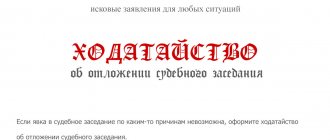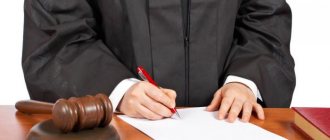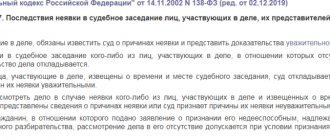New edition of Art. 190 Code of Civil Procedure of the Russian Federation
1. Judicial debates consist of speeches by persons participating in the case and their representatives. In judicial debates, the plaintiff, his representative, speaks first, then the defendant, his representative.
2. The third party, who has declared an independent claim regarding the subject of the dispute in the initiated process, and his representative in the judicial debate speak after the parties and their representatives. The third party, who has not made independent claims regarding the subject of the dispute, and his representative in the judicial debate speak after the plaintiff or defendant, on the side of one of whom the third party participates in the case.
3. The prosecutor, representatives of state bodies, local government bodies, organizations and citizens who have applied to the court for the protection of the rights and legitimate interests of other persons speak first in the judicial debate.
4. After speeches have been made by all persons participating in the case and their representatives, they can make remarks in connection with what has been said. The right of the last remark always belongs to the defendant, his representative.
What are legal pleadings?
The arguments of the parties are considered to be statements by the participants in the proceedings about the evidence in the case, the guilt of the defendant and the outcome of the case. A strictly defined circle of people can present arguments in the case. The order of debate is regulated by Chapter 38 of the Code of Criminal Procedure of the Russian Federation.
The prosecutor and the defense attorney are required to participate in the debate between the parties in criminal proceedings, but also, with the permission of the court, the victim, the defendant, and in civil cases - the plaintiff, the defendant and their legal representatives can speak.
The time for speaking is not limited, but the Criminal Procedure Code of the Russian Federation states that the judge has the right to stop a participant in the debate if he deviates from the essence of the case.
Only the court can ask questions to the speakers, but after the speech, the opposite party to the proceeding has the right to respond to the arguments of the previous participant in the debate between the parties.
Who can participate in the debate?
The obligatory persons to participate in the debate are the public prosecutor and the defendant's defense attorney. In a private prosecution, the role of prosecutor will be played by the injured party.
In principle, at the request or request, both the defendant and the victim, and civil plaintiffs and defendants, as well as their legal representatives, can speak in the debate.
After the debate, the defendant will have the last word. No one but him can be the last to speak out on the matter.
Speeches in judicial debates are made in the following sequence: the first is the state prosecutor, and the last are the lawyer and the defendant. All other sequence of speeches is determined by the judge at his own discretion.
When everyone has voiced their position on the case in the debate, after everyone has spoken, the participants will also be able to add one more remark as part of the debate on the case.
Simply put, after everything you have heard, you will be given the opportunity to make comments on the statements of previous speakers.
State Prosecutor's Speech
The prosecutor begins the debate. A common behind-the-scenes judicial practice is the situation when the prosecutor has not prepared for the debate on the case, which is why the court hearing is postponed on the initiative of the judge. Prosecutors often change in criminal cases; this is normal practice.
The purpose of the prosecutor's speech in the debate is to substantiate the guilt of the defendant and ask for the maximum possible punishment under the article. You should not think that the prosecutor is extremely unfriendly towards you. He is obliged to ask for maximum responsibility in the debate.
So, the prosecutor in the debate on the case says the following:
- Briefly outlines the circumstances of the criminal case, usually reading from the indictment;
- What is the defendant accused of with reference to articles of the Criminal Code of the Russian Federation;
- Particularly mentions the aggravating circumstances of the criminal case;
- Casually mentions mitigating circumstances in a criminal case;
- He asks to impose the maximum punishment allowed under the article.
Focusing on aggravating circumstances, the prosecutor can talk about the following:
- That the defendant did not pay damages;
- That he has a previous conviction;
- That he is a repeat offender;
- That the defendant does not have a permanent place of work or residence, is registered with a narcologist, etc.
Defender's speech
After the prosecutor, as a rule, the defendant's lawyer speaks. The lawyer’s task is to present the defendant’s identity as favorably as possible and ask for the minimum possible criminal punishment under the article.
The lawyer must speak about the following in the debate:
- Does the defense agree with the classification of the crime under a specific article of the Criminal Code of the Russian Federation;
- That the aggravating circumstances of the case have not been established;
- Tries to justify the behavior of the defendant;
- Characterizes his personality in every possible way;
- Mentions many mitigating circumstances of the case;
- He asks either to acquit the client, or to impose the minimum possible punishment under the article, or a punishment not related to actual deprivation of liberty.
Characterizing the personality of the defendant and describing mitigating circumstances, the lawyer can talk about the following:
- That the client repented, actively contributed to solving the crime, and confessed;
- That the defendant has a permanent place of residence or work;
- That the defendant has taken the path of reform;
- That he has dependent minor children;
- That the client is of advanced age or has chronic illnesses, which does not allow him to serve his sentence in prison, etc.
The lawyer must fully support the position of his client. If the defendant denies everything, the defense attorney must also actively deny the defendant’s guilt, even if all the circumstances of the case prove otherwise.
Victim's speech
The judge must ask the injured party if she wishes to speak in the debate on the case. If she agrees, the victim will be given the floor.
It is not at all necessary that the victim will fully support the position of the state prosecutor. Perhaps he will consider that the defendant, due to remorse, does not deserve too severe a punishment.
The victim will speak the following theses during the debate:
- Consequences in the form of material, physical or moral damage resulting from the crime;
- Whether the defendant paid damages;
- What punishment does he consider necessary to impose on the defendant?
During the debate, none of the participants in the process may ask questions or interrupt the speaker. Only a judge has this right.
Defendant's speech
The defendant, as the main character of the entire trial, will, of course, also get the floor. He will even get the floor twice: during the debate and during the last word.
During the pleadings, the defendant must speak about the following:
- Did he admit guilt, did he repent?
- Did he apologize to the victim or compensate for the damage;
- Mention mitigating circumstances for sentencing: children, health, age;
- Ask him to acquit or impose a minimum punishment.
After the judge says that the arguments are over, the defendant will be given the right to say the last word. The defendant has the right to refuse the last word.
The last word is the final remark of the entire process, when you can turn to the judge and other participants for the last time, asking for mercy or leniency.
The judge has the right to adjourn the court hearing after the end of the debate before the start of the last word. As a rule, this action is practiced in the case when the judge’s verdict is not yet ready, other cases are coming next, and there is not enough time.
At the next meeting, the judge comes with a ready-made verdict, listens to the last word, goes into the deliberation room, after which he announces the finished verdict.
Asking questions to the defendant during his last word is not allowed.
The last word is also not limited in time, but the judge can stop the speaker if his speech is not relevant to the case under consideration.
In fact, the defendant's last word has no bearing on the outcome of the case . That is why many accused people refuse it altogether.
During the pleadings, additional documents or evidence related to the case may be presented to the court for review.
If the judge considers that, in connection with their presentation, it is necessary to once again understand the details of what happened, he can again resume the judicial investigation after the debate. Then the entire study will be repeated again, and after the new judicial investigation is closed, the debate between the parties will begin again.
Debate between the parties in a criminal case is an obligatory part of the criminal process. In a general sense, the debate is announced in the context of the person’s guilt and the choice of responsibility applied to him.
Each side in the debate pursues its own goal and speaks in a manner appropriate to the goal . However, the final decision in the case is always made by the judge alone in accordance with the strict classification of the crime and the current norms of the Criminal Code of the Russian Federation.
Why are debates between the parties necessary?
The main purpose of judicial debate in criminal proceedings is to ensure compliance with the principle of adversarial proceedings. The goals of the speakers are radically different. The prosecutor tries to prove the guilt of the defendant and substantiate his position with the materials of the case. The defender, depending on the chosen tactics, either denies his client’s guilt or admits it, but indicates the grounds for mitigating the punishment. The line of defense must be based on the defendant's attitude towards the prosecution. If he does not admit his guilt, then the lawyer must deny it.
The judge is obliged to take into account the speeches in the debate when making a decision on the case. Sometimes this stage of the proceedings leads to an additional review of all case materials, a rehearing and new arguments between the parties. Only after them the court makes a decision on the case.
The defendant, having decided to speak in the debate between the parties, also retains the right to the last word at the end of the entire trial and before the judge retires to the deliberation room.
Prosecutor in a criminal trial
Everything that the prosecutor did during the investigation, the evidence collected, the approved position, is summed up in a monologue in court. The blocks and the sequence of their presentation in the constructed monologue may differ depending on the circumstances in the case.
In his statement, the accuser must:
- Reveal the violation of the law and the illegal act committed by the accused.
- Provide evidence to prove guilt.
- Mark evidence that is not confirmed, on the basis of which it should be rejected by the court.
Well-chosen arguments help the prosecutor convince the court of the correctness of his position. The punishment is announced and the personality of the accused is assessed. Based on Articles 39 and 37 of the Code of Criminal Procedure, the severity of the crime, its type and nature are described. For example, they were accused of theft, or perhaps they proved participation in fraud.
The prosecutor must justify the classification of the illegal act.
The actions of the defendant must constitute a crime and be charged under a specific article of the Criminal Code.
It is important to know the content and follow the order of the parties' debates, in accordance with which the parties' debates take place. The prosecutor should not indicate exact terms for individual penalties. In legal proceedings, this is the prerogative of the court. If there is damage, the prosecutor can put forward his thoughts on how it should be compensated to the injured party.
Statement by the State Prosecutor
During the speech, the prosecutor requests the maximum sentence for the defendant, taking into account the qualifications of the case. In his speech, the prosecutor states:
- the circumstances of the case listed in the charge sheet;
- charging the defendant in accordance with the provisions of the Criminal Code of the Russian Federation;
- aggravating circumstances, if any;
- extenuating circumstances. But the prosecutor does not focus on them. This is the task of the defender.
In the speech of the prosecutor, a characterization of the defendant is given, taking into account his life circumstances. In particular, the prosecutor will indicate whether this citizen has previously been convicted, whether he is registered with a narcologist, whether he has a job and place of residence. Particular attention is paid to compensation for damages to defendants.
Have a question for a lawyer? Ask now, call and get a free consultation from leading lawyers in your city. We will answer your questions quickly and try to help with your specific case.
Telephone in Moscow and the Moscow region: +7
Phone in St. Petersburg and Leningrad region: +7
Free hotline throughout Russia: 8 (800) 301-39-20
Process continuity principle
During the existence of the USSR, criminal proceedings in court were continuous. Regarding the principle of continuity in Soviet criminal proceedings, there are many speculations that do not correspond to reality.
Continuity did not mean that the criminal hearing that had begun could not be interrupted. This meant that the court that declared a break in a criminal case did not have the right to consider other criminal cases during the break.
Taking into account the fact that in the USSR there was no division in district courts into judges who considered only criminal cases and judges who considered exclusively civil cases, during breaks in criminal cases it was possible to consider civil cases or administrative materials.
Since there were many cases, including criminal ones, before the judges, the judges got out of the situation by announcing not a break, but a postponement of the criminal case, if there was even the slightest reason for this. After the hearing was adjourned, judges were free to consider other criminal cases.
At the first court hearing after the adjournment, the court again announced the composition of the court and established the procedure for examining the case.
Statement by the victim and private prosecutor
The judge is obliged to ask the victim about his desire to speak in the debate of the parties in the criminal case. In civil cases, the victim acts as an accuser and independently puts forward demands for recovery of damages from the defendant.
In the speech, the victim says:
- about the damage caused;
- its compensation to the defendant;
- necessary punishment for the culprit.
In criminal cases, the victim may agree with the prosecutor's demands, but may also ask the court to reduce the defendant's sentence.
Recommendations from professionals
To win in a civil or any other case, you can study a clear example of how debates proceed at a court hearing. Based on the successful speeches of others, it will be easier to compose a speech for yourself. Experienced lawyers recommend drafting it in such a way that the speech actually represents a draft court decision. What is meant is not so much its description as its motivation.
The lawyer’s professionalism plays a significant role in the debate. On his part, legal analysis is mandatory. It should be:
- verified from a logical point of view;
- be based on legislative acts and legal norms.
The lawyer examines the evidence that was presented during the trial. He also looks for weak spots in his opponent’s arguments and reinforces his own position.
Most often, problems with speech arise in arbitration or civil proceedings, since the judge does not give the parties time to prepare. But it should be recalled that all participants in the case have the right to apply for a break. Even if it is only a few minutes, you will already be able to concentrate and think about how to structure your speech.
Defender's statement
After the prosecutor, the lawyer speaks in the debate between the parties. He may ask to acquit the defendant if the latter does not admit his guilt. Otherwise, the lawyer will ask to reduce the defendant’s sentence to the minimum possible, based on the circumstances that give him the right to do so.
The defender's speech will say:
- about agreement or disagreement with the classification of the crime;
- absence of aggravating circumstances;
- aspects justifying the actions of the defendant;
- the presence of mitigating circumstances and positive characteristics of the defendant.
The lawyer’s goal in the debate between the parties in court is to present his client in the best light, proving the absence of his guilt in the crime in question or the presence of reasons for its commission, which provide for the imposition of a more lenient punishment.
Absentee judgment
In cases where the defendant does not appear at the court hearing and does not inform the court about valid reasons for the failure to appear and does not file a motion to consider the case without his presence, the court may consider the case in absentia proceedings.
If several defendants are involved in the case, the court considers the case in absentia only if all defendants fail to appear.
There are two exceptions:
- when the plaintiff does not agree to consider the case in the absence of the defendant(s);
- if the plaintiff changed the subject and grounds of the claim or increased the amount of the claims.
In these cases, the court postpones the consideration of the case and again sends the defendant a notice of the place and time of a new court hearing.
When considering a case in absentia, the court hearing is conducted in accordance with the general procedure. Based on the results of the consideration of the case, the court issues a judgment in absentia.
An absentee court decision differs from an ordinary one only in that its operative part must indicate the time limit and procedure for filing an application to cancel this court decision.
The defendant and the plaintiff who asked to consider the case without his participation? copies of the court's decision in absentia must be sent within three days from the date of its adoption with notification of receipt.
Speech by the defendant
The peculiarity of the defendant’s speech is that after the debate he will have the right to the last word. These two speeches are not much different in content, so defendants often refuse the last word.
The main thing that the defendant must note is:
- does he admit his guilt;
- whether he regrets what he did and whether he compensated the victim for the damage;
- whether he has grounds to ask for a reduced sentence.
To summarize, this debater must ask the court to acquit him or reduce his punishment.
Replica
After speeches have been made by all participants in the debate of the parties, each of them can speak one more time with a remark (Part 6 of Article 292 of the Code of Criminal Procedure of the Russian Federation). Replica
— a remark or objection from a participant in the debate regarding what was said in the speeches of other participants (clause 36 of Article 5 of the Code of Criminal Procedure of the Russian Federation).
As a rule, the content of a remark is a short statement in the form of an objection addressed to a participant on the other side regarding his position on the case. The criminal procedural legislation of Russia does not provide for the mandatory participation of any of the participants in the debate with a rejoinder. This is the exclusive right of the participant who made a speech in the judicial debate, therefore the court, after all participants in the debate have delivered their speech, must find out about their desire to exercise the right of rejoinder. The sequence of speech is determined by the court, taking into account the opinions of the participants, or by the participants themselves. But in accordance with Part 6 of Art. 292 of the Code of Criminal Procedure of the Russian Federation, the right of the last remark belongs to the defendant or his defense attorney. Each participant in the debate may speak only once.
How to behave during court hearings?
The Code of Criminal Procedure of the Russian Federation defines the requirements for holding debates between the parties. Participants in the process are required to speak on the merits of the case and not interrupt each other. The law prohibits asking questions of other speakers. Only the court has this right. However, it is possible to respond to the opposing party’s speech after it has ended.
The key component of the debate is the guilt of the defendant and his punishment. Since the goals of the speakers are different, they strive to present this topic from their own positions. In this case, participants in the debate are required to rely on the evidence base in the case.
Additional court decision in a civil case
Sometimes when making decisions, judges make some shortcomings or omissions. In particular, some of them are directly named in the law (Article 201 of the Code of Civil Procedure of the Russian Federation). These include:
- failure to make a decision on any of the claims contained in the statement of claim (See publications: “Form of the statement of claim”; “Content of the statement of claim”; “Sample statement of claim”), although the evidence regarding it was examined during the trial;
- lack of indication in the decision of the amount of the awarded amount, the property to be transferred or the actions that the defendant is obliged to perform;
- failure to resolve the issue of legal costs.
In such cases, the court, on its own initiative or at the request of persons participating in the case, makes an additional decision. In this case, the question of making an additional decision can be raised only before the main decision enters into legal force. Persons participating in the case must be notified (See: Court notices and summonses) of the place and time of the court hearing at which the issue of making an additional decision will be considered.
In addition, on its own initiative or at the request of the persons participating in the case, the court, in the same manner, can correct clerical errors or arithmetic errors made in the court decision, as well as at the request of the persons participating in the case or the bailiff, explain to them the court decision in the case of its obscurity for them.
Private complaints may be filed against court rulings to refuse to accept an additional court decision, correct errors or clarify a court decision.
Visualization and images
One of the most important tasks of a trial lawyer is to draw the court’s attention to written evidence, to “force” the court to read what it needs. According to research, only 20% of people perceive information by hearing, 80% need to see it. You need to visualize as much as possible for the judge the main thing that makes up the essence of your position.
Millennial jurors: how do lawyers convince them that they are right?
It is difficult to make presentations in our courts, but you can draw the judge’s attention to documents. For example, you refer to a specific clause of the contract. This can be done through emotional emphasis in the speech, but it is best to let the judge read the important passage himself. This can be done by handing over the text to the court or by referring to the volume and sheet of the case so that the judge can read it himself. If this results in the judge starting to read the desired passage, you have achieved your goal.
When something is extremely difficult to perceive by ear, do not hesitate to use visual materials, structures and flowcharts. For example, a complex corporate relationship can only be understood by seeing it visually depicted.
You need to understand that a speech composed of mere reasoning cannot be retained in the head. This means engaging the listener with comparisons that animate your narrative. For example, a dispute about the quality of the material. You claim that the other party itself violated the storage requirements. Standard phrase: “The terms of the contract imposed on the plaintiff the obligation to store materials. Contrary to its obligations, the plaintiff did not comply with the rules for storing products, violating the temperature regime.” Or you can say it differently: “Under the terms of the contract, the plaintiff was responsible for storing materials on the site. Throughout the year, winter and summer, the materials simply lay in the rain and snow without shelter. The materials have deteriorated due to careless storage.”
Simplicity and clarity
In Western legal culture, there is the concept of “legalease” - this is when a speech or document contains an excessive amount of legal terms or legal “jargon”. Lawyers are specially trained to present legal arguments in simple and understandable language that is accessible to any reader - the client.
Professional speakers have a term - “caring for the audience.” I think this is very characteristic of judicial speech. Judicial speech must be understood by those to whom it is addressed. Every thought of the speaker must be understood by the listener in the same way as by himself.
It is important to avoid templates. The speech should not contain the formally correct names of legislative acts. For example, “Federal Law “On Joint-Stock Companies” dated December 26, 1995 N 208-FZ.” These phrases are not appropriate for oral speech. It is much better to say “law on joint stock companies”.
Numbers are also always bad for auditory perception, especially small ones, so you should avoid reproducing them orally to the nearest penny in every possible way.
While listening to audiobooks, you may have found yourself losing track and going back to listen to a passage again. Legal text is one of the most difficult to understand, containing little emotion. For this reason, the listener's brain automatically closes off the information being presented.
What to do? It is necessary, while respecting the listener, to convey the most important information to him. Some colleagues believe that the main arguments of a position should be voiced at the beginning, and some - at the end. If you are new to the judge's profile, I recommend putting one strong argument at the beginning, then several weaker ones, and several strong arguments at the end.





